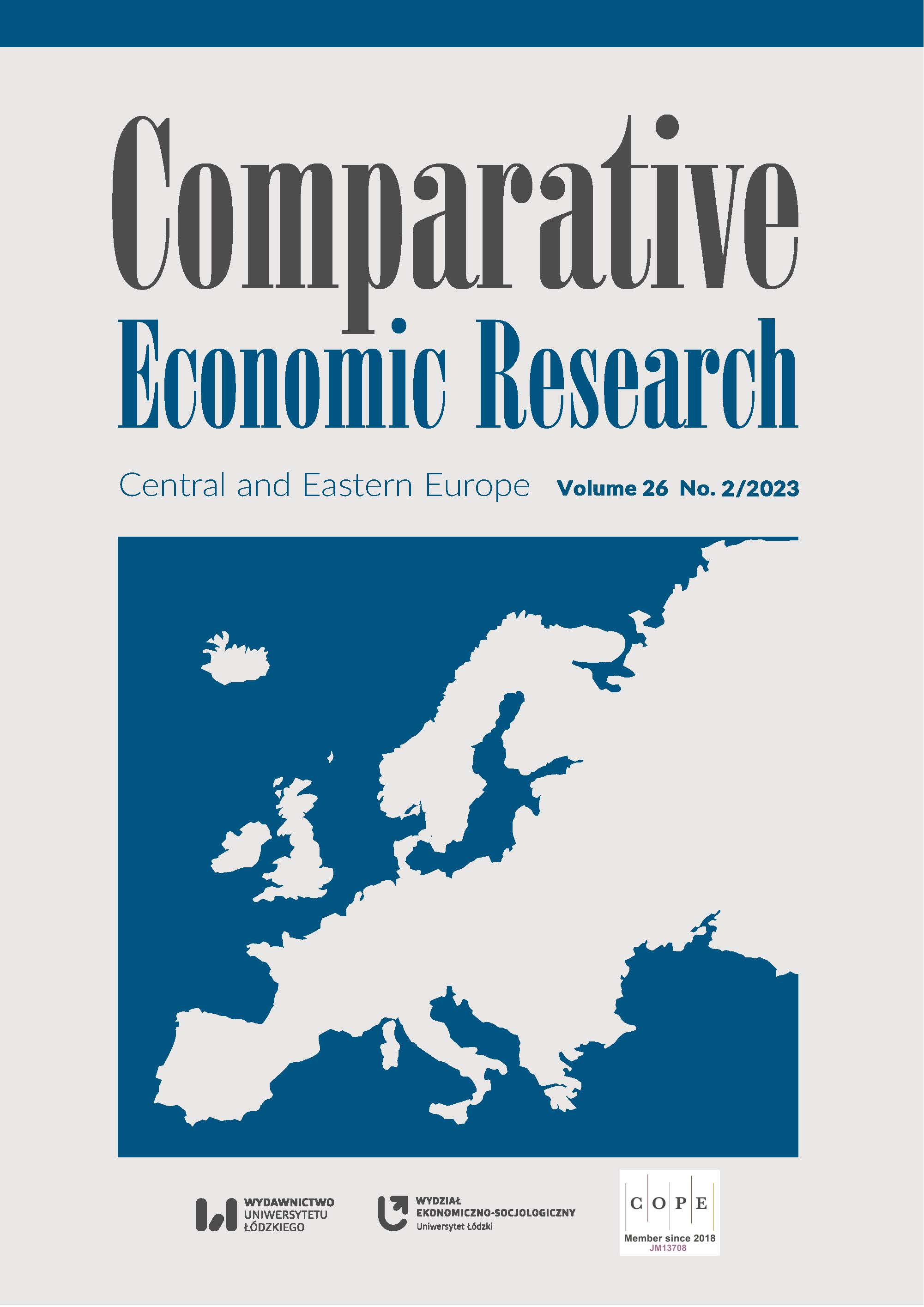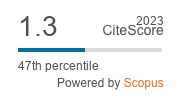Innovative Clusters of Global Trade Leadership
DOI:
https://doi.org/10.18778/1508-2008.26.13Keywords:
Index of economic complexity, intellectualization, clustering of countries, commodity exportsAbstract
The formation of a new global system and systemic global interdependence has generated new competitiveness factors for market participants, determining their appropriate strategic behavior to ensure a highly competitive position and leadership. Therefore, the purpose of the study is to identify the countries of intellectual leaders in the global market and the factors that influence the positions that countries achieve in terms of leadership. The following research methods were used: multifactor regression models, cluster analysis, and comparative analysis. Based on the authors’ methodology for assessing countries’ intellectual leadership, the clustering of countries in the global economy is determined. The evaluation algorithm was based on three levels: 1) resources, 2) the intermediate results of intellectual activity, and 3) the final results of overall progress.
Using a multifactor regression model and cluster analysis, four clusters of countries were identified according to key indicators of intellectual leadership. For each cluster, the specialization of the two countries in terms of merchandise exports was analyzed: cluster 1 – the United States and Germany; cluster 2 – Israel and Italy; cluster 3 – Brazil and Ukraine; cluster 4 – China and South Korea. Each country is assigned an index of economic complexity, and the change in position of each country within a cluster over ten years is noted.
An important goal is to understand the determinants of the leadership of countries in each geographic region.
The analysis is based on the cluster analysis carried out in previous publications. The clustering of countries was carried out based on the dynamics of macroeconomic indicators over the past 15 years.
Downloads
References
Colecchia, A., Schreyer, P. (2002), ICT Investment and Economic Growth in the 1990s: Is the United States a unique Case? A Comparative Study of Nine OECD Countries, “Review of Economic Dynamics”, 5 (2), pp. 408–442, https://www.sciencedirect.com/science/article/abs/pii/S1094202502901705 (accessed: 28.05.2022).
Google Scholar
DOI: https://doi.org/10.1006/redy.2002.0170
Hanzhi, Y., Wang, H. (2022), The emergence of Chinese high‑and new‑technology companies in the global arena: challenges and opportunities for governance innovation, “Journal of Chinese Governance”, 7, pp. 52–57, https://doi.org/10.1080/23812346.2021.1967639
Google Scholar
DOI: https://doi.org/10.1080/23812346.2021.1967639
Hong, J. (2017), Causal relationship between ICT R&D investment and economic growth in Korea, “Technological Forecasting and Social Change”, 116, pp. 70–75, https://doi.org/10.1080/23812346.2021.1967639
Google Scholar
DOI: https://doi.org/10.1016/j.techfore.2016.11.005
Jorgenson, D.W., Vu, K. (2005), Information Technology and the World Economy, “Scandinavian Journal of Economics”, 107 (4), pp. 631–650, https://onlinelibrary.wiley.com/doi/10.1111/j.1467-9442.2005.00430.x (accessed: 1.06.2022).
Google Scholar
DOI: https://doi.org/10.1111/j.1467-9442.2005.00430.x
Jorgenson, D.W., Vu, K. (2010), Potential growth of the world economy, “Journal of Policy Modeling”, 32 (5), pp. 615–631, https://doi.org/10.1016/j.jpolmod.2010.07.011
Google Scholar
DOI: https://doi.org/10.1016/j.jpolmod.2010.07.011
Kalenyuk, I., Tsymbal, L. (2021), Assessment of the intellectual component in economic development, “Scientometrics”, 126 (6), pp. 4793–4816, https://doi.org/10.1007/s11192-021-03958-3
Google Scholar
DOI: https://doi.org/10.1007/s11192-021-03958-3
Kalenyuk, І., Antoniuk, L., Kuklin, О., Tsymbal, L., Tsyrkun, О. (2022), Modelling the impact of intellectualization on economic growth in Ukraine, “Financial and Credit Activity Problems of Theory and Practice”, 4 (45), pp. 175–190, https://doi.org/10.55643/fcaptp.4.45.2022.3834
Google Scholar
DOI: https://doi.org/10.55643/fcaptp.4.45.2022.3834
Kretschmer, T. (2012), Information and communication technologies and productivity growth: A survey of the literature, “OECD Digital Economy Papers”, 195, OECD Publishing, Paris.
Google Scholar
OECD (2011), ISIC REV. 3 Technology Intensity Definition, OECD Directorate for Science, Technology and Industry Economic Analysis and Statistics Division, 7, https://www.oecd.org/sti/ind/48350231.pdf (accessed: 20.09.2022).
Google Scholar
Oliner, S.D., Sichel, D.E. (2000), The Resurgence of Growth in the Late 1990s: Is Information Technology the Story?, “Journal of Economic Perspectives”, 14 (4), pp. 3–22, https://doi.org/10.1257/jep.14.4.3
Google Scholar
DOI: https://doi.org/10.1257/jep.14.4.3
Skorupinska, A., Torrent‑Sellens, J. (2013), The role of ICT in the productivity of Central and Eastern European countries: cross‑country comparison, https://www.researchgate.net/publication/268576747_The_role_of_ICT_in_the_productivity_of_Central_and_Eastern_European_countries_cross-country_comparison (accessed: 20.11.2022).
Google Scholar
Solow, R.M. (1956), A Contribution to the Theory of Economic Growth, “The Quarterly Journal of Economics”, 70 (1), pp. 65–94, https://doi.org/10.2307/1884513
Google Scholar
DOI: https://doi.org/10.2307/1884513
The Atlas of Economic Complexity (n.d.), http://atlas.cid.harvard.edu/countries (accessed: 15.10.2022).
Google Scholar
The objectives of the Global Innovation Clusters (2022), Innovation, Science and Economic Development Canada, https://ised-isde.canada.ca/site/global-innovation-clusters/en/objectives-innovation-clusters-initiative (accessed: 31.05.2022).
Google Scholar
United Nations (2020), International Trade Statistics Yearbook 2019, vol. I, https://comtradeapi.un.org/files/v1/app/publicationfiles/2019/VolI2019.pdf (accessed: 15.10.2022).
Google Scholar
Vicente, J. (2022), The economics of clusters, [in:] Elgar Encyclopedia on the Economics of Knowledge and Innovation, Chapter 11, pp. 98–107, https://doi.org/10.4337/9781839106996.00016
Google Scholar
DOI: https://doi.org/10.4337/9781839106996.00016
Yeganegi, K., Najafi, A. (2022), The impact of innovation strategies on export performance, a case study: textile industry, “International Journal of Scientific Research and Management”, 10 (12), pp. 4314–4321, https://doi.org/10.18535/ijsrm/v10i12.em05
Google Scholar
DOI: https://doi.org/10.18535/ijsrm/v10i12.em05
Downloads
Published
How to Cite
Issue
Section
License

This work is licensed under a Creative Commons Attribution-NonCommercial-NoDerivatives 4.0 International License.











